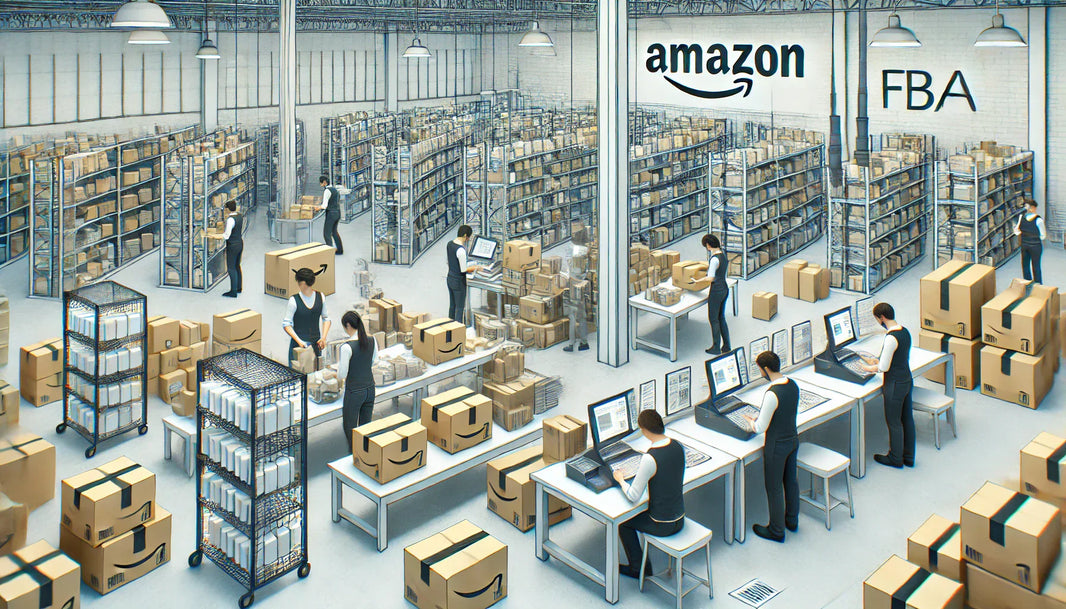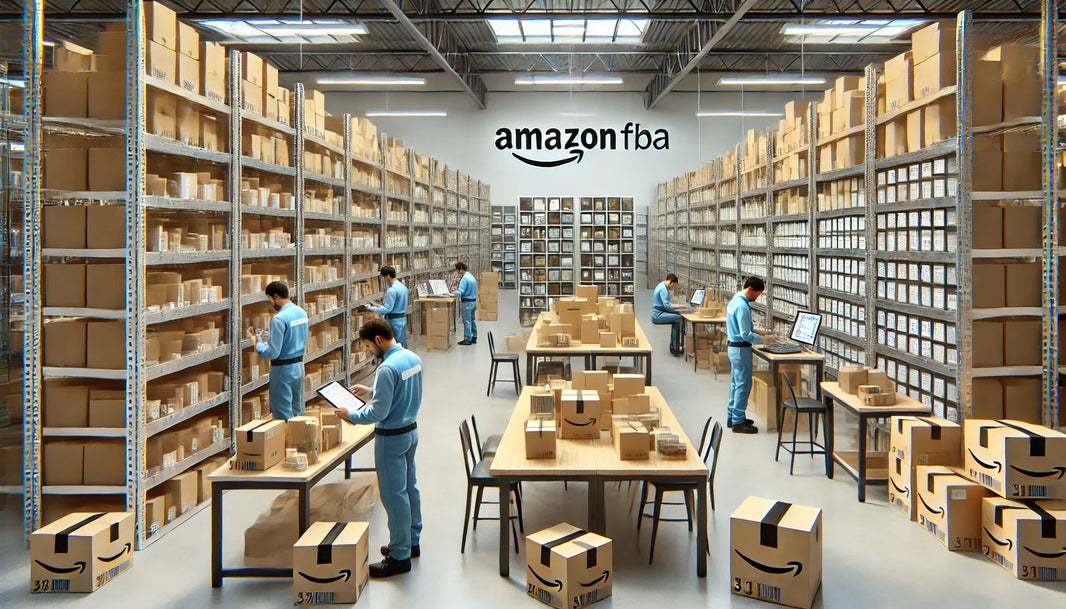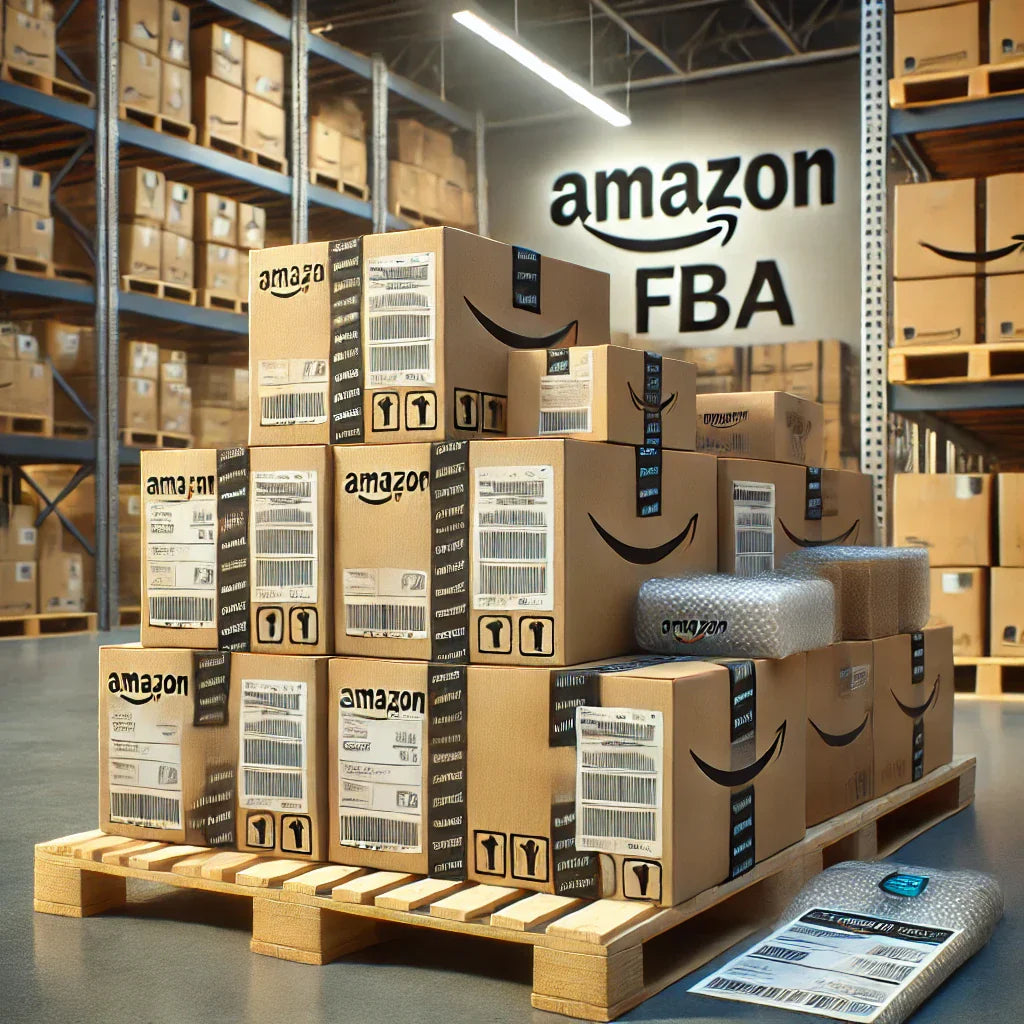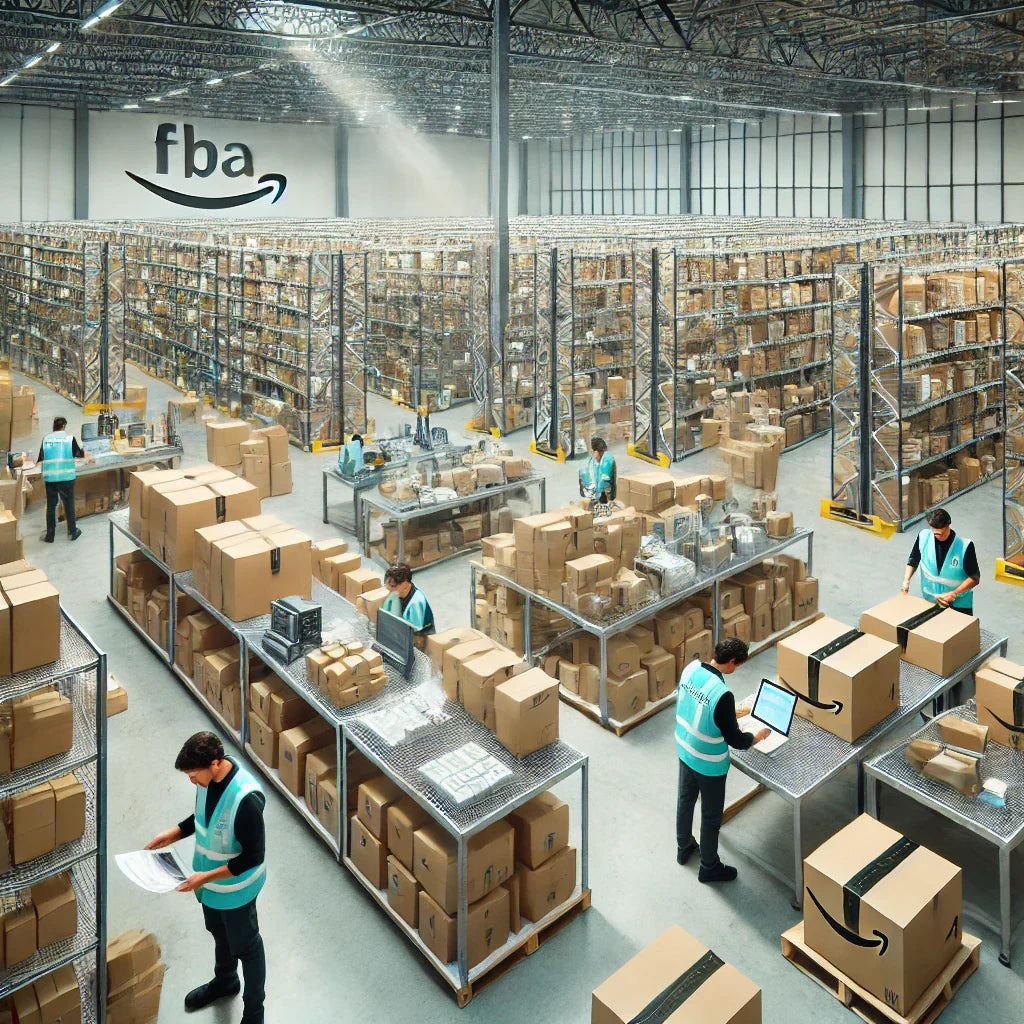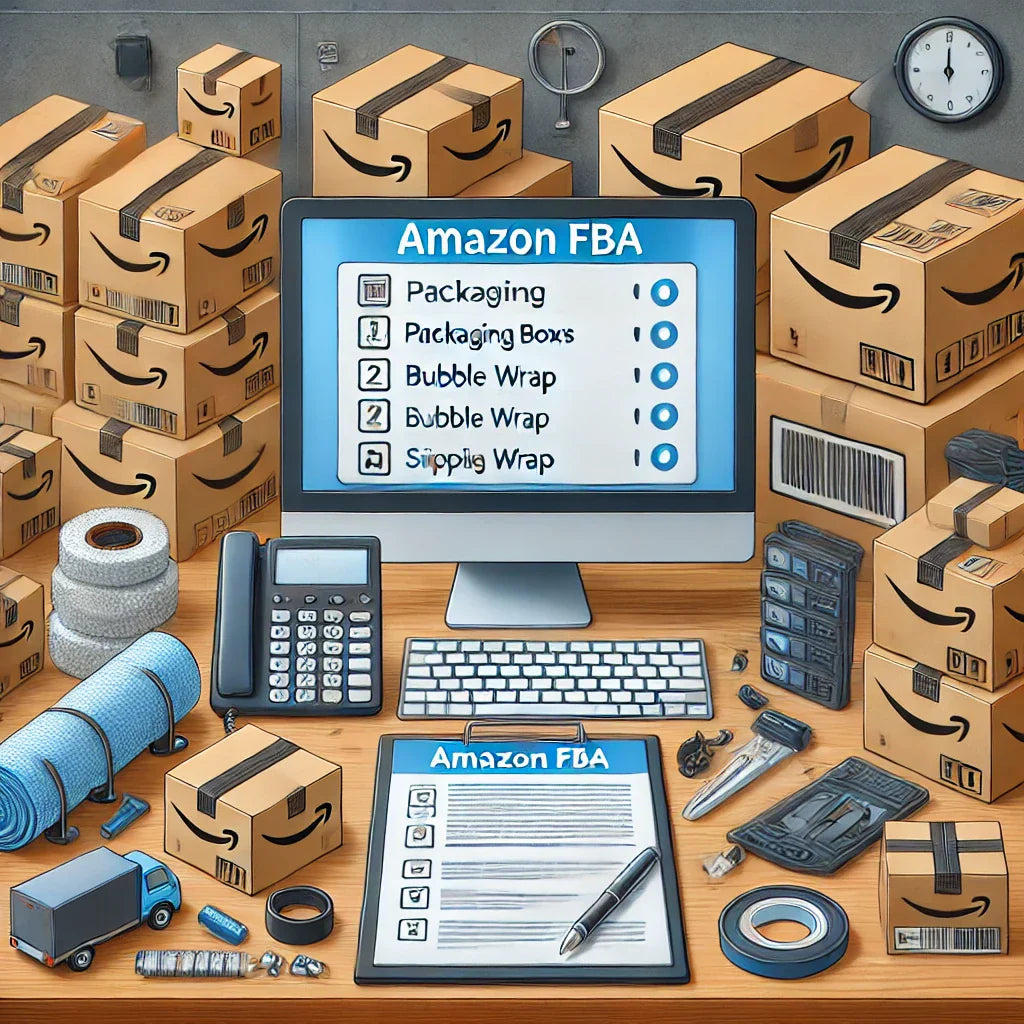In today’s competitive market, businesses constantly seek ways to optimize their supply chain and enhance operational efficiency. Partnering with a third-party logistics (3PL) provider has become an essential strategy, especially for companies navigating complex logistics demands, such as Amazon prep services and fulfillment requirements. A 3PL provider can streamline processes, reduce costs, and help businesses focus on core activities while leaving the logistics complexities to experts. In this article, we’ll explore the top benefits of using a 3PL provider, showing how this strategic decision can be a game-changer for companies looking to thrive in a dynamic marketplace.

Enhanced Operational Efficiency
One of the most significant advantages of working with a 3PL provider is the immediate boost to operational efficiency. Managing logistics in-house can be time-consuming and requires significant resources, including infrastructure, staffing, and advanced technology. 3PL providers specialize in logistics management and have the expertise, technology, and processes needed to handle tasks like warehousing, order fulfillment, and transportation with optimal efficiency. By outsourcing these logistics tasks, businesses can focus on their core activities, ensuring their resources are directed toward growth initiatives instead of logistical challenges.
Access to Expertise and Advanced Technology
Partnering with a 3PL provider allows businesses to leverage cutting-edge technology and logistics expertise without making substantial investments themselves. Leading 3PL providers have access to advanced tools and platforms, including real-time inventory tracking, warehouse management systems, and predictive analytics. These technologies provide businesses with greater visibility and control over their supply chain operations, enabling them to make data-driven decisions and improve overall performance. Additionally, the specialized knowledge and skills that 3PL providers bring can help businesses stay compliant with evolving industry regulations and standards, such as those related to Amazon prep services, which are often complex and constantly changing.
Scalability and Flexibility
For growing businesses, the ability to scale logistics operations efficiently is essential. A 3PL provider offers flexibility that allows companies to adjust their logistics support based on seasonal fluctuations, demand surges, or new market expansions. For example, if your business experiences increased demand during the holiday season, a 3PL provider can accommodate that growth by providing additional warehousing and transportation resources. This flexibility ensures that companies don’t overextend themselves or risk customer satisfaction due to logistical bottlenecks. Additionally, 3PL providers offer solutions that can be scaled down during slower periods, allowing businesses to manage costs more effectively.
Cost Savings and Improved Resource Allocation
Outsourcing logistics to a 3PL provider can lead to significant cost savings. Managing logistics in-house requires substantial investments in infrastructure, technology, and labor, which can strain resources for small to medium-sized businesses. A 3PL provider has established networks, bulk shipping discounts, and efficient warehousing practices that can reduce these costs. By relying on a 3PL, businesses eliminate the need to invest in expensive assets like warehouse facilities and fleets of trucks. This cost efficiency enables companies to allocate their financial resources toward other strategic areas, such as marketing, product development, or customer service improvements, which can drive growth and competitive advantage.
Enhanced Customer Satisfaction
Customer satisfaction is directly influenced by efficient and timely order fulfillment. 3PL providers prioritize optimizing delivery times, ensuring that customers receive their orders quickly and accurately. Many 3PL providers have extensive transportation networks, which allow them to offer a range of shipping options, including expedited delivery. This flexibility in shipping improves customer experience, as they have options that suit their needs. Additionally, 3PL providers’ experience in handling Amazon prep services, such as packaging and labeling requirements, ensures that orders meet platform-specific guidelines, preventing delays and minimizing the risk of non-compliance penalties.
Greater Focus on Core Competencies
Outsourcing logistics tasks to a 3PL provider allows companies to refocus on their core competencies and strategic goals. Instead of dedicating time and resources to managing warehousing, inventory, and transportation, businesses can direct their efforts toward product development, brand growth, and customer engagement. This focus on core activities often leads to higher productivity and innovation within the company, as employees are able to work on tasks that align with the company’s mission and objectives. In a fast-paced, competitive market, the ability to concentrate on core strengths can be a key factor in achieving long-term success.
Reduction of Risk and Liability
In the logistics industry, risks such as damage, theft, and delays are always present. 3PL providers mitigate these risks through well-established processes, security measures, and insurance coverage. Many 3PLs also stay up-to-date with regulatory requirements across different regions, ensuring compliance with industry standards. For example, when handling Amazon prep services, a 3PL provider is well-versed in the specific labeling and packaging requirements necessary to avoid non-compliance penalties. This expertise reduces the risk of costly mistakes and protects businesses from potential liabilities, providing peace of mind and allowing companies to focus on growth rather than logistics challenges.
Improved Inventory Management
Effective inventory management is crucial to prevent stockouts or overstocking, both of which can have adverse effects on a business. 3PL providers use advanced inventory management systems to monitor stock levels in real time, helping businesses maintain optimal inventory levels. This real-time tracking allows companies to adjust inventory based on demand, ensuring they have the right amount of product available at all times. Furthermore, 3PLs can assist with inventory forecasting, helping businesses anticipate demand trends and prepare accordingly. Improved inventory management not only reduces costs associated with excess inventory but also enhances customer satisfaction by ensuring that products are available when needed.

Enhanced Visibility and Data Insights
A modern 3PL provider offers comprehensive reporting and analytics tools that provide valuable insights into logistics performance. Through real-time data tracking, businesses can monitor shipments, inventory levels, and order statuses at any point in the supply chain. This visibility allows companies to identify potential bottlenecks and inefficiencies, make informed decisions, and improve operational efficiency. Additionally, 3PL providers often use predictive analytics to forecast demand and identify trends, enabling businesses to stay ahead of customer needs. These data-driven insights provide a strategic advantage by allowing businesses to make proactive adjustments to their supply chain operations.
Simplified Global Expansion
Expanding into new international markets presents logistical challenges, including customs regulations, currency differences, and varying delivery times. 3PL providers have experience navigating these complexities and can facilitate a smooth transition into new markets by handling international shipping and regulatory compliance. Many 3PL providers have established networks across multiple countries, enabling faster and more reliable cross-border shipping. For businesses looking to expand their global reach, partnering with a 3PL provider simplifies the process by eliminating the need to establish a logistics infrastructure in each new market. This support allows businesses to capitalize on global opportunities without being hindered by logistical obstacles.
Environmental Sustainability Initiatives
Many 3PL providers have adopted sustainable practices to minimize their environmental impact. By optimizing transportation routes, reducing packaging waste, and implementing energy-efficient warehousing practices, 3PL providers contribute to a more sustainable supply chain. Businesses can align with these initiatives by choosing a 3PL provider committed to sustainability, which enhances their brand image and appeals to environmentally-conscious consumers. Additionally, some 3PL providers offer carbon offset programs, allowing businesses to offset the environmental impact of their logistics operations. By collaborating with a 3PL that prioritizes sustainability, businesses can reduce their carbon footprint and demonstrate their commitment to environmental responsibility.
Access to a Vast Network of Partners and Resources
3PL providers have established relationships with carriers, suppliers, and other logistics partners, which allows them to offer competitive rates and reliable services. This network is especially beneficial for small to medium-sized businesses that may not have the resources to negotiate directly with multiple carriers. By leveraging the 3PL provider’s network, businesses can benefit from reduced shipping costs, faster transit times, and improved reliability. The extensive resources available through a 3PL partnership also provide businesses with greater flexibility and resilience in their supply chain operations, as they can quickly adapt to changes in demand or disruptions in the market.
Reduced Capital Investment
Establishing an in-house logistics infrastructure requires significant capital investment in facilities, equipment, and technology. By outsourcing logistics to a 3PL provider, businesses can avoid these upfront costs and allocate their capital to other strategic initiatives. The cost savings associated with a 3PL partnership are especially beneficial for startups and growing businesses with limited financial resources. Instead of investing in warehousing and transportation assets, companies can focus on scaling their operations, expanding their product line, or enhancing their customer experience. This flexibility in capital allocation gives businesses the financial agility needed to respond to market opportunities and challenges.
Improved Supply Chain Agility
In today’s fast-paced business environment, supply chain agility is crucial for responding to market changes and customer demands. A 3PL provider offers the flexibility needed to adapt quickly to changing circumstances, whether it’s a sudden spike in demand or a disruption in the supply chain. This agility is particularly valuable for e-commerce businesses and those operating in highly competitive industries, where customer expectations for fast delivery are high. By partnering with a 3PL, businesses gain the ability to respond to these fluctuations without compromising service quality, ensuring a consistent and reliable customer experience.
Increased Flexibility in Shipping and Fulfillment Options
When businesses handle their logistics in-house, they are often limited to a narrow set of shipping and fulfillment options, which can lead to inflexibility and higher costs. A 3PL provider, however, has partnerships with various carriers and access to a broader network, allowing them to offer multiple shipping solutions that can be tailored to the unique needs of each client. For example, some 3PLs provide same-day, overnight, and economy shipping options that allow companies to meet a diverse range of customer expectations. This flexibility not only enhances the customer experience but also provides businesses with the ability to adjust their shipping strategy based on cost and demand. Additionally, 3PL providers can help optimize routes, consolidate shipments, and implement strategies like zone skipping to minimize costs and improve delivery times.
Flexibility in fulfillment also extends to warehouse management. Many 3PL providers offer distributed warehousing, where inventory can be stored across multiple strategic locations. This distribution reduces the distance between products and end customers, enabling faster deliveries while lowering shipping costs. For businesses with customers across different regions, distributed warehousing through a 3PL provider offers a competitive advantage by ensuring timely delivery, improving service levels, and reducing transit times.
Streamlined Returns Management
Returns are an inevitable part of any business that deals with physical products, particularly in e-commerce where customer expectations around returns and exchanges are high. Managing returns can be a logistical challenge, requiring resources and time to process returns efficiently. 3PL providers often offer returns management services as part of their comprehensive logistics solutions. They have dedicated processes in place to handle returns quickly and efficiently, ensuring that returned products are restocked or disposed of as appropriate.
By outsourcing returns management to a 3PL, businesses can provide a smoother and more reliable returns process for customers, which is crucial for maintaining a positive brand reputation. Efficient returns handling also allows companies to restock items faster, making them available for resale sooner and reducing potential revenue loss. Additionally, many 3PL providers offer reverse logistics solutions that track the entire lifecycle of returned items, helping businesses gain insights into return trends and make adjustments to minimize future returns.
Enhanced Compliance and Regulatory Expertise
Navigating the world of logistics involves a range of regulatory and compliance requirements that vary by region, product type, and industry. For businesses shipping across borders or dealing with products that have specific compliance needs, such as food, electronics, or hazardous materials, keeping up with these regulations can be a daunting task. 3PL providers have dedicated teams who are well-versed in compliance matters and can help businesses stay aligned with the relevant regulations, whether they relate to international trade, import/export duties, or specific industry standards.
For businesses selling on platforms like Amazon, compliance with Amazon’s packaging, labeling, and safety standards is essential. Many 3PL providers specialize in Amazon prep services, ensuring that products meet Amazon’s strict requirements and avoid delays, penalties, or rejected shipments. This expertise is valuable for companies that lack the time or resources to manage these compliance details in-house, as it allows them to avoid costly mistakes and stay compliant across all distribution channels.
Risk Mitigation Through Diversified Supply Chains
The global logistics landscape is full of risks, from natural disasters and geopolitical tensions to supply chain disruptions caused by unforeseen events. When companies rely solely on in-house logistics, they often face increased exposure to these risks, as they may lack the resources to quickly adapt or recover. 3PL providers, on the other hand, are experts at managing these risks and have established contingency plans to maintain operational stability even during disruptions.
Many 3PLs use a diversified approach, with multiple transportation routes, warehousing options, and supplier networks to mitigate risks. This approach ensures that, if one part of the supply chain is affected, they can seamlessly shift operations to an alternate route or facility without impacting the business. Moreover, 3PL providers often monitor risk factors and potential disruptions in real-time, allowing them to respond quickly and minimize the impact on their clients’ operations. This proactive risk management protects businesses from the volatility that can occur within the supply chain and ensures that they maintain continuity in delivering goods to their customers.
Support for Omnichannel Retail
With the rise of e-commerce, consumers have become accustomed to purchasing products across multiple channels, from websites and mobile apps to physical stores. Managing an omnichannel retail strategy requires a complex logistics setup that can synchronize inventory, manage orders, and fulfill them across all channels seamlessly. 3PL providers offer specialized solutions that support omnichannel operations, allowing businesses to serve customers through various platforms while maintaining a single inventory system.
For example, if a business sells products both on its website and through Amazon, a 3PL provider can manage inventory for both channels, ensuring that stock levels are synchronized. This integration allows businesses to provide customers with a consistent experience, regardless of where they choose to shop. By centralizing order fulfillment for all channels under one 3PL provider, companies can avoid stockouts, reduce shipping times, and improve customer satisfaction. Additionally, 3PL providers with omnichannel expertise can analyze purchasing patterns and make recommendations to optimize inventory levels across channels.
Improved Handling of Seasonal Demand Peaks
Seasonal demand fluctuations are common in many industries, particularly in retail and e-commerce, where sales volumes can spike during the holiday season, Black Friday, or other promotional events. Scaling logistics to meet these seasonal demands can be challenging for businesses that manage logistics in-house, as it often requires additional resources that may not be needed year-round. A 3PL provider, however, can scale its services to match seasonal demand, providing additional warehousing, staffing, and shipping resources as needed.
By outsourcing to a 3PL provider, businesses can handle peak seasons without the hassle of hiring temporary staff, renting extra warehouse space, or arranging for additional transportation resources. 3PL providers have the infrastructure and flexibility to absorb these fluctuations efficiently, ensuring that customers receive their orders on time even during high-demand periods. This adaptability allows businesses to maximize sales during peak seasons without incurring the long-term costs associated with maintaining seasonal logistics capabilities year-round.
![]()
Data-Driven Decision Making and Continuous Improvement
Data plays a critical role in today’s logistics operations, providing insights that enable businesses to optimize processes and improve decision-making. 3PL providers collect and analyze vast amounts of data on shipping times, order accuracy, inventory turnover, and more. By partnering with a 3PL, businesses gain access to these valuable data insights, which can inform strategies for cost reduction, inventory management, and customer service improvement.
For example, 3PL providers can analyze historical sales data to forecast future demand, allowing businesses to prepare for upcoming sales spikes. Additionally, 3PLs use data to identify inefficiencies and make continuous improvements to their processes. Through performance metrics, businesses can track KPIs like order accuracy, delivery speed, and customer satisfaction, enabling them to make data-driven adjustments to their supply chain strategy. This focus on continuous improvement not only reduces operational costs but also enhances the overall customer experience.
Strengthened Brand Reputation and Competitive Advantage
In the modern marketplace, customer expectations are high, and the ability to meet those expectations consistently plays a significant role in shaping brand reputation. Efficient logistics, fast shipping, and reliable order fulfillment all contribute to a positive customer experience, which in turn boosts brand loyalty and competitive advantage. A 3PL provider can help businesses meet these high standards by providing the infrastructure, technology, and expertise needed to maintain exceptional service levels.
Furthermore, many consumers value transparency in the supply chain, particularly regarding sustainability and ethical sourcing. By choosing a 3PL provider that shares these values, businesses can strengthen their brand’s reputation and appeal to socially conscious consumers. For example, some 3PL providers offer eco-friendly packaging options or use fuel-efficient transportation methods, allowing companies to reduce their environmental impact. By aligning with a 3PL provider that prioritizes these initiatives, businesses can differentiate themselves from competitors and enhance their brand image.
Cost Predictability Through Service Agreements
One of the challenges businesses face with logistics is the unpredictable nature of costs. In-house logistics management can lead to unexpected expenses related to labor, equipment maintenance, or fluctuating transportation fees. Many 3PL providers offer fixed-cost service agreements that provide businesses with predictable monthly expenses, making budgeting easier. These agreements typically cover a wide range of services, from warehousing and order fulfillment to transportation and customer service, ensuring that all logistics needs are met under one comprehensive plan.
Cost predictability is particularly beneficial for small and medium-sized businesses, which may have limited budgets and less flexibility to absorb unexpected logistics costs. By outsourcing to a 3PL provider with a fixed-cost agreement, businesses can gain peace of mind knowing their logistics expenses will remain stable. This stability allows them to allocate resources more effectively, reinvest in growth initiatives, and avoid the financial strain associated with fluctuating logistics costs.
Ability to Handle Special Handling Requirements
Some products require special handling due to their size, fragility, or temperature sensitivity. For businesses managing these products, logistics can become complicated and costly if handled in-house. Many 3PL providers have the specialized equipment, trained staff, and processes to manage products with specific handling requirements, from perishable goods to oversized items.
For instance, 3PL providers with climate-controlled warehousing facilities can manage temperature-sensitive goods, ensuring that products remain safe and compliant with quality standards. Similarly, 3PLs that specialize in handling fragile or oversized items have the tools and expertise needed to prevent damage during storage and transit. By outsourcing these specialized logistics needs, businesses can avoid the high costs and operational challenges associated with managing unique product requirements, ensuring that customers receive products in optimal condition.
Efficient Management of Labor Resources
Logistics operations are labor-intensive, and maintaining a sufficient workforce to handle tasks like warehousing, packing, and shipping can be challenging. Managing labor resources in-house requires businesses to recruit, train, and retain staff, which can be time-consuming and expensive.
Enhanced Inventory Accuracy Through Real-Time Tracking
Inventory accuracy is vital for avoiding issues such as stockouts, overstocking, and misplaced products, all of which can lead to lost sales and dissatisfied customers. 3PL providers employ advanced warehouse management systems (WMS) that use real-time tracking to ensure high levels of inventory accuracy. By using technologies such as barcode scanning, RFID tags, and automated data capture, 3PLs can monitor stock levels with precision, providing clients with up-to-date inventory insights. This accuracy allows businesses to keep the right amount of inventory on hand, reducing storage costs and ensuring that products are readily available for customers when needed.
The real-time tracking provided by 3PLs is particularly beneficial for businesses with complex inventory needs, such as those managing multiple SKUs or selling across multiple channels. With real-time data, businesses can quickly adjust inventory levels in response to demand changes, reducing the risk of stockouts and enhancing customer satisfaction. Moreover, by improving inventory accuracy, businesses can streamline reorder processes and avoid the high costs associated with overstocked or understocked inventory.
Comprehensive Order Management and Streamlined Fulfillment
Order management is a critical component of the logistics process, encompassing everything from receiving and processing orders to preparing them for shipment. For companies managing a large volume of orders, especially across multiple sales channels, this process can become overwhelming. 3PL providers offer sophisticated order management systems (OMS) that integrate with e-commerce platforms, ERP systems, and other sales channels, providing a centralized view of all orders. This integration enables businesses to manage orders more efficiently, improve order accuracy, and minimize fulfillment times.
With a 3PL provider handling order management and fulfillment, businesses can focus on their strategic priorities while ensuring that orders are processed and shipped accurately. 3PLs also have the flexibility to adapt to order fluctuations, allowing them to handle higher order volumes during peak periods. Streamlined fulfillment services contribute to faster delivery times, improved order accuracy, and a better customer experience, which in turn strengthens customer loyalty and enhances brand reputation.

Reduced Lead Times and Faster Delivery to Market
Time-to-market is a critical factor for success, especially for businesses in competitive industries where speed is an advantage. By leveraging a 3PL provider’s network of distribution centers, transportation resources, and optimized logistics processes, businesses can significantly reduce lead times and bring products to market faster. Faster lead times not only give companies a competitive edge but also allow them to respond to market trends and customer demands more quickly.
3PL providers are adept at managing complex logistics processes, from sourcing raw materials to final product distribution, which helps companies streamline their entire supply chain. Additionally, with strategically located warehouses and optimized shipping routes, 3PL providers can minimize transit times, ensuring that products reach end customers faster. For businesses launching new products or responding to seasonal demand, this speed to market can make a substantial difference in capturing sales and enhancing brand reputation.
Improved Cash Flow Management
Efficient logistics operations can have a positive impact on cash flow, a crucial factor for businesses of all sizes. By outsourcing logistics to a 3PL provider, companies can reduce the capital tied up in warehousing, transportation, and labor, freeing up resources for other investments. Furthermore, with lower inventory levels and faster turnaround times, businesses can shorten the cash conversion cycle, meaning they get paid sooner after each sale.
Improved cash flow management also comes from reduced overhead costs, as 3PL providers offer scalable solutions that allow businesses to pay for only the logistics services they use. This cost-effectiveness is especially advantageous for smaller businesses and startups that need to manage cash flow carefully. With a reliable 3PL provider handling logistics, companies can optimize their cash flow, enabling them to reinvest in growth opportunities and pursue new business initiatives without being weighed down by logistics costs.
Enhanced Customer Service and Support Capabilities
Customer service plays a pivotal role in customer retention and brand loyalty. A 3PL provider can support a business’s customer service initiatives by ensuring that logistics operations run smoothly, accurately, and consistently. Many 3PL providers offer dedicated customer support teams that work alongside businesses to resolve any logistics-related issues, such as delivery delays, tracking concerns, or product damages. By providing efficient and responsive customer service, 3PLs help companies maintain a positive customer experience, which is essential for building brand loyalty.
In addition to resolving customer issues, some 3PL providers offer value-added services that enhance the customer experience, such as gift wrapping, personalized notes, or branded packaging. These touches can help a brand stand out in a crowded marketplace, giving customers a memorable unboxing experience that reflects positively on the company. By outsourcing these specialized services to a 3PL, businesses can focus on their core competencies while ensuring that their customers receive excellent service.
Tailored Solutions for Complex Supply Chains
Every business has unique logistics needs, and 3PL providers offer customized solutions to meet these requirements. Whether a company deals with temperature-sensitive products, high-value items, or products with unique handling requirements, a 3PL provider can tailor its services to match these specific needs. For instance, companies in the healthcare industry may require cold chain logistics for sensitive pharmaceutical products, while businesses dealing with high-value electronics might need extra security measures. 3PL providers have the expertise and resources to handle these complex requirements, providing businesses with the assurance that their products are safe and compliant with industry standards.
Customized logistics solutions also extend to specialized packaging, kitting, and labeling services that cater to a company’s unique branding and product requirements. With a 3PL provider handling these details, businesses can offer their customers a tailored experience that aligns with their brand identity, ensuring consistency across all customer touchpoints.
Minimized Shipping Costs Through Optimized Transportation Networks
Shipping costs are a significant expense for businesses, especially those that ship large volumes or serve a wide geographic area. 3PL providers have established relationships with carriers and a deep understanding of transportation logistics, allowing them to negotiate competitive shipping rates. Additionally, many 3PL providers use optimized transportation networks that take advantage of bulk shipping discounts, route optimization, and multi-modal transportation options to reduce costs.
For businesses, these cost savings translate to lower operational expenses and improved profit margins. 3PLs also provide flexibility in shipping methods, such as choosing between air, ground, or sea freight based on the urgency of the shipment. With access to a broad range of transportation options, businesses can select the most cost-effective method for each shipment, balancing cost savings with delivery speed. This flexibility ensures that companies maintain control over their shipping expenses while meeting customer expectations for timely delivery.
Detailed Reporting and Analytics for Better Strategic Planning
The data and analytics capabilities offered by 3PL providers are invaluable for strategic planning. Detailed reports on metrics such as order accuracy, shipping times, and inventory levels provide businesses with a comprehensive view of their logistics performance. Armed with this information, companies can make informed decisions, identify areas for improvement, and develop strategies to optimize their supply chain.
Moreover, some 3PL providers offer advanced analytics services, including predictive analytics that forecast demand trends and customer preferences. These insights enable businesses to anticipate changes in the market, adjust inventory levels, and optimize their supply chain to meet future demands. By leveraging data-driven insights from a 3PL provider, businesses can make strategic adjustments that reduce costs, enhance efficiency, and improve customer satisfaction.
Improved Employee Satisfaction and Productivity
Managing logistics in-house can be a significant burden on employees, particularly if logistics is not their primary expertise. When businesses handle their logistics, employees may find themselves overwhelmed by tasks like inventory management, order processing, and tracking shipments. By outsourcing logistics to a 3PL provider, companies can alleviate this workload, allowing employees to focus on tasks that align with their skill sets and contribute to the business’s core objectives.
When employees are freed from logistics tasks, they can dedicate more time to strategic projects, enhancing overall productivity and job satisfaction. Additionally, by partnering with a 3PL provider, businesses reduce the likelihood of burnout among staff members responsible for logistics, leading to a healthier work environment. Satisfied and engaged employees are more likely to contribute positively to the business, driving innovation and improving performance in other areas of the company.
Enhanced Security and Risk Mitigation in Warehousing
The security of warehousing facilities is a top priority for businesses storing valuable inventory, as theft, damage, and loss can lead to significant financial repercussions. 3PL providers often have robust security measures in place, including 24/7 surveillance, secure access controls, and alarm systems, to safeguard client inventory. This added layer of protection provides peace of mind for businesses, as they know their products are secure.
Additionally, 3PL providers are experienced in managing various types of inventory, including high-value, temperature-sensitive, or hazardous materials, and have protocols in place to mitigate risks. Their expertise ensures that products are stored safely and in compliance with regulatory standards. By choosing a 3PL provider with strong security and risk management practices, businesses can protect their assets, reduce the risk of financial loss, and focus on growth initiatives rather than security concerns.
Greater Adaptability to Evolving Market Conditions
The logistics landscape is constantly evolving, influenced by factors such as technological advancements, regulatory changes, and shifting consumer preferences. 3PL providers stay abreast of these changes and adapt their services accordingly, allowing businesses to remain competitive in an ever-changing market. For example, as e-commerce has grown, many 3PLs have expanded their capabilities to include services like last-mile delivery, omnichannel fulfillment, and automation in order processing.
This adaptability enables businesses to respond quickly to market trends without having to invest in new logistics infrastructure or retrain employees. By outsourcing logistics to a 3PL provider, companies gain the flexibility to pivot their logistics strategy as needed, whether that means adopting new technologies, expanding into new markets, or adjusting to new regulations.
![]()
Conclusion
Partnering with a 3PL provider offers numerous benefits that can enhance a business’s operational efficiency, customer satisfaction, and overall growth potential. From advanced technology and cost savings to improved inventory management and supply chain agility, the advantages of working with a 3PL are clear. For businesses navigating complex logistics demands, such as Amazon prep services and international shipping, a 3PL partnership provides the expertise and resources needed to optimize logistics operations. By choosing a 3PL provider, companies can focus on their core competencies, expand their market reach, and deliver a superior customer experience, positioning themselves for long-term success in an increasingly competitive marketplace.
Read More
- What is 3PL? Understanding the Basics of Third-Party Logistics
- 3PL vs. 4PL: Key Differences and How to Choose the Right Logistics Partner
- How 3PL Services Improve Supply Chain Efficiency and Reduce Costs
- Choosing the Best 3PL Provider: Essential Factors to Consider
- The Future of 3PL: Emerging Trends in Third-Party Logistics
- How 3PL Logistics Solutions Empower E-commerce Businesses to Scale


